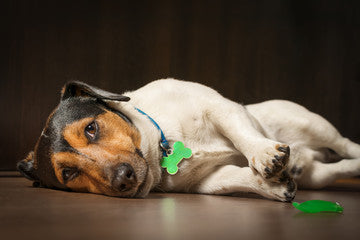
Diarrhoea
Share
Diarrhoea is a common condition in dogs and cats. The severity can range from mild and self limiting to fatal. I will dive into specific conditions that cause diarrhea in later articles/blogs. This is merely a general notation about the disorder.

We have all been woken up numerous times in a night to accompany a dog outside to do its business or been surprised by an overflowing litter box.
Diarrhoea can entail anything from slightly loose stools to projectile watery consistency, and everything in between. Mucous, blood and worms can be an added extra. The characteristics of the stool can be a general indication of the severity of inflammation occurring in the gut. The more watery and bloody the deeper the layers of the gut mucosa affected. Numerous bacteria and viruses can be the culprits, along with parasites, inappropriate diet and various disease processes.
Acute diarrhea can cause dehydration, electrolyte imbalance and death
On a chronic basis malabsorption with subsequent weight loss and the long term effects of organ failure can become a reality.
The following signs are cause for concern and indicate that your pet’s immediate life might be in jeopardy.
- Dehydration (if you lift up a fold of skin on the back of your pet’s neck, it should go back to normal the instant it is let go. If it tents/stays up, your pet is dehydrated)
- Fresh blood or black faeces indicate internal bleeding. A large amount in connection with white gums could be an indicator of trouble
- Not eating or drinking in excess of 24 hours
- Vomiting affecting intake of fluids and food for longer than 24 hours
- A puppy that has had less than the recommended, initial 3 basic vaccinations.
HOME INFO
- The most important thing is to keep your pet hydrated
- Encourage drinking by adding a small amount of chicken broth, soup or tuna juice to their water
- Syringe some water onto the tongue every hour – please don’t force this, there is a danger of aspiration which can cause lung infection
- Ice cubes are also a good option, especially if your pet is inquisitive and playful. (this applies mostly to warm countries)
- No food for 12 hours, if condition is acute (i.e. going on for less than two days)
- Once you start feeding again, or the condition is chronic, offer boiled chicken (no skin or spices) and rice (this can be helpful for the absorption of toxins). Small amounts frequently during the day.
- Deworm (if overdue) once you are sure your pet is stable
- A probiotic will be helpful to replenish the good gut bacteria and help return things to a normal function. There are plenty good quality products available at pet stores and vet shops.
- A small amount of plain, low fat, as natural as possible, yoghurt will help if a probiotic is out of reach
- Slippery elm (Ulmus rubra) helps for cramps and soothes gut lining. Herb powder mixed (50/50) with probiotic powder given at ¼ teaspoon for 5kg 2 times per day, over fresh food or in water
- Human rehydrate products are generally safe for use in dogs. Use the unflavored one. If you are mixing it in drinking water please ensure the availability of a plain water bowl at all times in case your pet senses it’s presence
- Chamomile (Matricaria recutita) is a powerful anti-inflammatory and even if not directly effective for the diarrhoea, the antioxidant, the calming effect promotes sleep, which promotes healing.
- Lifewave patches: Carnosine
I truly hope this helps you, wherever in the world you are.
Wishing you and your pet all of the very best.
Dr Sarah
